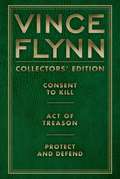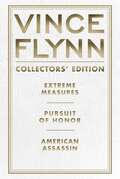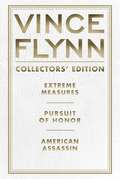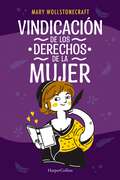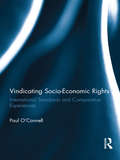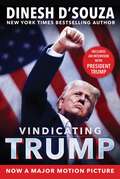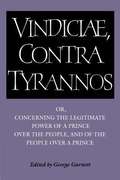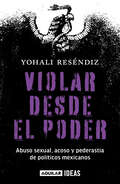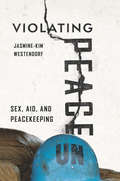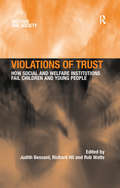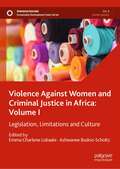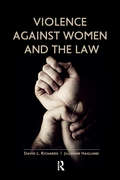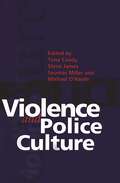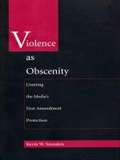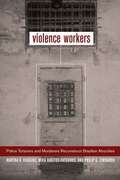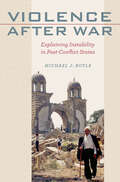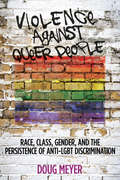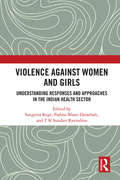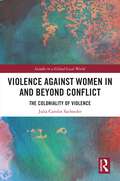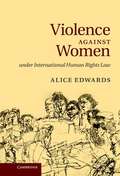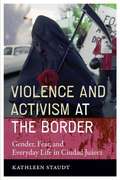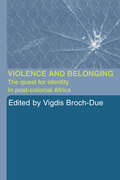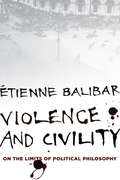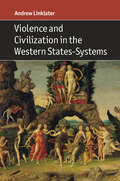- Table View
- List View
Vince Flynn Collectors' Edition #3: Consent to Kill, Act of Treason, and Protect and Defend (A Mitch Rapp Novel)
by Vince FlynnIn this special collectors' edition, relive the action in Vince Flynn's #1 New York Tmes bestselling political thrillers: Consent to Kill, Act of Treason, and Protect and Defend.Consent to KillAn eye for an eye: that's what the powerful father of a dead terrorist demands in retribution--and with his hate-filled plea, Mitch Rapp becomes the target of an explosive international conspiracy. The fearless operative has both killed with impunity and tortured to avert disaster, all in a battle to preserve freedom. But even among America's allies, some believe the time has come to bring Rapp down. Now the unter is the hunted, and Rapp must rely on his razor-sharp instincts for survival--and justice--as he unleashes his fury on those who have betrayed him.Act of TreasonIn the final weeks of a fierce presidential campaign, a motorcade carrying candidate Josh Alexander is shattered by a car bomb. Soon after the attack, Alexander is carried to victory by a sympathy vote, but his assailants have not been found. When CIA director Irene Kennedy and Special Agent Skip McMahon receive damagin intelligence on Washington's most powerful players, they call on Mitch Rapp--the one man reckless enough to unravel a global network of contract killers on an explosive mission that leads back to the heart of our nation's capital...and the inner sanctum of the Oval Office.Protect and DefendNo longer willing to wait for the international community to stop its neighboring enemy, Israel brings down Iran's billion-dollar nuclear program in an ingeniously conceived operation. The attack leaves a radioactive tomb and environmental disaster in its wake, and has Iranian president Amatullah calling for blood--American blood. Seeing opportunity where others fear reprisals, Mitch Rapp devises a brilliant plan to humiliate Iran's government and push the nation to the brink of revolution. But when a back-channel meeting between CIA director Irene Kennedy and her Iranian counterpart goes disastrously wrong, Rapp is locked in a showdown with a Hezbollah mastermind in league with Amatullah--and he is given twenty-four hours to do whatever it takes to stop unthinkable catastrophe.
Vince Flynn Collectors' Edition #4: Extreme Measures, Pursuit of Honor and American Assassin
by Vince FlynnIn this special collectors’ edition, relive the action in Vince Flynn’s #1 New York Times bestselling political thrillers: Extreme Measures, Pursuit of Honor, and American Assassin. Extreme Measures: In the secretive world where fearless men and women wage a daily covert war, the CIA has intercepted two terrorist cells--but a third, led by a dangerous mastermind, is feared to be on the loose. Counterterrorist agent Mitch Rapp joins forces with a warrior as dedicated—and lethal—as they come: ex-Marine and elite operative Mike Nash. Both Rapp and Nash have stared down the jihadist culture of death. Both have saved thousands of lives without accolades or acknowledgment of their personal sacrifices. But the political winds have changed on Capitol Hill, and certain leaders want Mitch Rapp put back on a short leash. And when a nightmare scenario descends on Washington, D.C., Rapp and Nash will follow new rules of engagement: their own. Pursuit of Honor: When Washington, D.C.'s National Counterterrorism Center is struck by a series of devastating explosions, the results are catastrophic—185 killed, including public officials and CIA employees. Such an act of extreme violence calls for extreme measures—and elite counterterrorism operative Mitch Rapp, joining forces with trusted team member Mike Nash, finds himself in the frustrating position of having to illustrate the realities of national security to government officials up in arms over the agents who rushed in to save countless American lives. Meanwhile, with three al-Qaeda terrorists still at large and Nash traumatized by the horrors he witnessed during the attack, Rapp must help his friend while threading his way through the naysayers on Capitol Hill—and silently, swiftly, do what he must for the sake of his country and the pursuit of honor. American Assassin: Before he was considered a CIA superagent, before he was thought of as a terrorist’s worst nightmare, and before he was both loathed and admired by the politicians on Capitol Hill, Mitch Rapp was a gifted college athlete without a care in the world... and then tragedy struck. Two-hundred and seventy souls perished that cold December night of the Pan Am Lockerbie terrorist attack, and thousands of family and friends were left searching for comfort. Mitch Rapp was one of them, but he was not interested in comfort. He wanted retribution.
Vince Flynn Collectors' Edition #4: Extreme Measures, Pursuit of Honor, and American Assassin (A Mitch Rapp Novel)
by Vince FlynnIn this special collectors' edition, relive the action in Vince Flynn's #1 New York Tmes bestselling political thrillers: Extreme Measures, Pursuit of Honor, and American Assassin.Extreme MeasuresIn the secretive world where fearless men and women wage a daily covert war, the CIA has intercepted two terrorist cells--but a third, led by a dangerous mastermind, is feared to be on the loose. Counterterrorist agent Mitch Rapp joins forces with a warrior as dedicated--and lethal--as they come: ex-Marine and elite operative Mike Nash. Both Rapp and Nash have stared down the jihadist culture of death. Both have saved thousands of lives without accolades or acknowledgment of their personal sacrifices. But the political winds have changed on Capitol Hill, and certain leaders want Mitch Rapp put back on a short leash. And when a nightmare scenario descends on Washington, D.C., Rapp and Nash will follow new rules of engagement: their own. Pursuit of HonorWhen Washington, D.C.'s National Counterterrorism Center is struck by a series of devastating explosions, the results are catastrophic--185 killed, including public officials and CIA employees. Such an act of extreme violence calls for extreme measures--and elite counterterrorism operative Mitch Rapp, joining forces with trusted team member Mike Nash, finds himself in the frustrating position of having to illustrate the realities of national security to government officials up in arms over the agents who rushed in to save countless American lives. Meanwhile, with three al Qaeda terrorists still at large and Nash traumatized by the horrors he witnessed during the attack, Rapp must help his friend while threading his way through the naysayers on Capitol Hill--and silently, swiftly, do what he must for the sake of his country and the pursuit of honor.American AssassinBefore he was considered a CIA superagent, before he was thought of as a terrorist's worst nightmare, and before he was both loathed and admired by the politicians on Capitol Hill, Mitch Rapp was a gifted college athlete without a care in the world . . . and then tragedy struck. Two-hundred and seventy souls perished that cold December night of the Pan Am Lockerbie terrorist attack, and thousands of family and friends were left searching for comfort. Mitch Rapp was one of them, but he was not interested in comfort. He wanted retribution.
Vindicación de los derechos de la mujer
by Mary WollstonecraftVindicación de los derechos de la mujer es una de las primeras obras filosóficas de corte feminista. Este ensayo es una respuesta a las posturas sobre el acceso a la educación que tenían las mujeres del siglo xviii, limitado a los saberes domésticos. Wollstonecraft discute la posición de la mujer en la sociedad a partir de la educación que reciben, destacando su participación como educadoras de los hijos, pues, argumenta, esto forma parte crucial para el progreso de una nación. Asimismo, la escritora discute la creencia de la desigualdad de pensamiento entre hombres y mujeres, sosteniendo que la educación de la mujer debería ser racional, igual a la de los hombres.A Vindication of the Rights of WomanA Vindication of the Rights of Woman is one of the first philosophical works of a feminist nature. This essay is a response to the positions on the access to education that women had in the eighteenth century, limited to domestic knowledge.Wollstonecraft discusses the position of women in society based on the education they receive, highlighting their participation as educators of their children, since, she argues, this is a crucial part of a nation's progress. Likewise, the writer discusses the belief of inequality of thought between men and women, arguing that women's education should be rational, equal to that of men.
Vindicating Socio-Economic Rights: International Standards and Comparative Experiences (Routledge Research in Human Rights Law)
by Paul O'ConnellNotwithstanding the widespread and persistent affirmation of the indivisibility and equal worth of all human rights, socio-economic rights continue to be treated as the "Cinderella" of the human rights corpus. At a domestic level this has resulted in little appetite for the explicit recognition and judicial enforcement of such rights in constitutional democracies. The primary reason for this is the prevalent apprehension that the judicial enforcement of socio-economic rights is fundamentally at variance with the doctrine of the separation of powers. This study, drawing on comparative experiences in a number of jurisdictions which have addressed (in some cases more explicitly than others) the issue of socio-economic rights, seeks to counter this argument by showing that courts can play a substantial role in the vindication of socio-economic rights, while still respecting the relative institutional prerogatives of the elected branches of government. Drawing lessons from experiences in South Africa, India, Canada and Ireland, this study seeks to articulate a "model adjudicative framework" for the protection of socio-economic rights. In this context the overarching concern is to find some role for the courts in vindicating socio-economic rights, while also recognising the importance of the separation of powers and the primary role that the elected branches of government must play in protecting and vindicating such rights. The text incorporates discussion of the likely impact and significance of the Optional Protocol to the International Covenant on Economic, Social and Cultural Rights, and looks at the implications of the Mazibuko decision for the development of South Africa’s socio-economic rights jurisprudence.
Vindicating Trump
by Dinesh D'SouzaDonald Trump is unquestionably the most unique and charismatic figure in American politics in a generation. Yet despite his familiarity on the public stage, he remains an enigmatic, mysterious figure. Not since Lincoln has a man drawn such intensely opposite responses, of love and hate, and even in Lincoln&’s case the intensity was over the issue of slavery. With Trump, the intensity is over the man. How can the same man inspire such radically opposite reactions, to the point that there are some who would take a bullet for him, and others who celebrate the would-be assassin who actually attempted to take his life? This is the Trump enigma. Then there are Republicans and moderates who seek to sidestep the enigma of Trump the man by saying, &“I don&’t like him, but I like his policies.&” Yet if Trump&’s critics are right that he is an aspiring tyrant, a dictator, something akin to Hitler circa 1933, it is the man—not the policies—that matter most. In an original, searching examination, bestselling author Dinesh D&’Souza considers the issue of tyranny in Vindicating Trump by asking key questions: Is Trump a tyrant, and would his election a second time imperil democracy and our constitutional system of government? If not—if he didn&’t do anything tyrannical in his term in office—then why do his critics say that about him? If Trump isn&’t the one imposing a tyrannical regime, then who is?D&’Souza makes the startling argument that Trump&’s critics accuse him of being a dictator—a Caesar—because Trump does possess the colossal dimensions of a Caesar. He could be a tyrant, if he wanted to. But he doesn&’t want to. Rather, he wants to use his immense charisma and power to mobilize the American people against the forces of tyranny and repression, coming from the Democrats and from the Left. This book—and the accompanying film in theaters this fall—is an unqualified defense and vindication of Trump. It makes the case for Trump &“as is,&” the man as well as the policies. It will rally and inspire Trump supporters and at the same time convince Americans who are ambivalent about Trump that he is the right &“wartime general&” for the perilous times we face in this country.
Vindiciae, Contra Tyrannos: Or, Concerning the Legitimate Power of a Prince Over the People, and of the People Over a Prince (Cambridge Texts in the History of Political Thought)
by Stephanius Jurius Brutus George S. GarnettThe Vindiciae, contra tyrannos was the most infamous of the monarchomach treatises produced during the French wars of religion. This edition presents the first complete and accurate English translation of the work, a comprehensive apparatus, and an introduction that provides the first detailed analysis of the argument and also reconsiders the much-disputed question of authorship. It will be of interest to a wide range of scholars working on the history of political thought and early modern Europe.
Violar desde el poder: Abuso Sexual, acoso y pederastia de politicos mexicanos
by Yohali ReséndizLa verdad trágica que produce rabia e indignación sobre algunos servidores públicos, magistrados, senadores o diputados, encargados de construir un México mejor, denunciados por cometer delitos sexuales. Violar desde el poder es una investigación que revela los abusos sexuales de políticos siniestros como Félix Salgado Macedonio, Benjamín Saúl Huerta, Juan Bustos, Manuel Horacio Cavazos, José Elías Medel Galindo, Juan Antonio Vera Carrizal, Cuauhtémoc Gutiérrez de la Torre y más, encubiertos por otros funcionarios, cómplices que desde sus cargos públicos se burlan del dolor mortal de las víctimas. Yohali Reséndiz entrevista a los múltiples afectados y revela las horrendas secuelas que estos actos de salvajismo y desvergüenza dejaron en mujeres, muchachos de 15 o 16 años y niñas violadas por sus propios familiares. La periodista remueve las aguas negras de la impunidad y da rostro a esos seres indefensos atacados con crueldad para sembrar en sus vidas traumas, dolor físico y emocional, impotencia y miedo. En estas páginas sin precedentes, el lector encontrará motivos para reflexionar y denunciar estos delitos que cometen funcionarios del gobierno que prometen una vida mejor, pero que actúan como depredadores amparados en el poder político. El libro se completa con una guía para denunciar ante ministerios públicos delitos de violación y abuso sexual. Hoy más que nunca México debe expresar surechazo a los feminicidios, a la violencia sexual y al abuso sexual infantil, este libro es una potente iniciativa para ello. abuso sexual ;acoso ;violacion ;abuso sexual infantil ;delitos sexuales ;pornografia ;pederastas ;impunidad ;denuncia ;violencia contra la mujer ;equidad de genero ;inclusion ;maltrato infantil ;feminicida ;delito ;impunidad ;víctimas de delitos sexuales;corrupcion ;trata de personas;trata de blancas;feminicidios;muertas de juares;escandalos sexuales;verdad mexicana;gobierno mexicano;narco gobierno;mexico feminicida;se va a caer;[Críticas/Reseñas]
Violating Peace: Sex, Aid, and Peacekeeping
by Jasmine-Kim WestendorfJasmine-Kim Westendorf's discomforting book investigates sexual misconduct by military peacekeepers and abuses perpetrated by civilian peacekeepers and non-UN civilian interveners. Based on extensive field research in Bosnia, Timor-Leste, and with the UN and humanitarian communities, Violating Peace uncovers a brutal truth about peacebuilding as Westendorf investigates how such behaviors affect the capacity of the international community to achieve its goals related to stability and peacebuilding, and its legitimacy in the eyes of local and global populations.As Violating Peace shows, when interveners perpetrate sexual exploitation and abuse, they undermine the operational capacity of the international community to effectively build peace after civil wars and to alleviate human suffering in crises. Furthermore, sexual misconduct by interveners poses a significant risk to the perceived legitimacy of the multilateral peacekeeping project, and the UN more generally, with ramifications for the nature and dynamics of UN in future peace operations.Westendorf illustrates how sexual exploitation and abuse relates to other challenges facing UN peacekeeping, and shows how such misconduct is deeply linked to the broader cultures and structures within which peacekeepers work, and which shape their perceptions of and interactions with local communities. Effectively preventing such behaviors is crucial to global peace, order, and justice. Violating Peace thus identifies how policies might be improved in the future, based on an account of why they have failed to date.
Violations of Trust: How Social and Welfare Institutions Fail Children and Young People (Welfare and Society)
by Richard HilThe past few decades have brought to light increasing evidence of systemic and repeated institutional abuse of children and young people in many western nations. Government enquiries, research studies and media reports have begun to highlight the widespread nature of sexual, physical and emotional abuse of vulnerable children and young people. However, while public attention has focused on 'episodic-dramatic' representations of institutional abuse, comparatively little emphasis has been given to the more mundane, routinized and systemic nature of abuse that has occurred. This book documents comprehensively a full range of abuse occurring in 'caring' and 'protective' institutions, with particular reference to the Australian case. The dominant theme is 'betrayal' and in particular the ways in which agencies charged with the care and protection of children and young people become the sites of abusive practices. The authors draw on a range of theoretical frameworks to explore issues of trust and betrayal in the context of the professional and ethical obligations which workers have to those in their charge. The authors argue that it is not sufficient merely to report on accounts of institutional abuse or the consequences of particular practices; rather it is necessary to locate the prevalence of institutional abuse in the wider context of institutional practices as they relate to the 'governance' of particular sections of the population.
Violence Against Women and Criminal Justice in Africa: Legislation, Limitations and Culture (Sustainable Development Goals Series)
by Ashwanee Budoo-Scholtz Emma Charlene LubaaleThis book examines violence against women in Africa and criminal justice from the perspective of African scholars, practitioners and experts. As a global and long-standing issue, violence against women is gaining public visibility across the African continent with some states announcing a national crisis warranting immediate redress. At the global level, the elimination of all forms of violence against all women and girls forms a key part of United Nations Sustainable Development Goal 5: Gender Equality. Split across two volumes, these books present a comprehensive analysis of the latest research and theories, principles and practices of criminal justice systems, criminal justice accountability mechanisms, and the key challenges women face in their quest for justice on the African continent. Volume I focusses on legislation and its impact, the limitations of criminal justice responses, and the cultural and social norms regarding access to justice. Volume II examines sexual violence and vulnerable women’s access to justice in Africa. They adopt a comparative approach that highlight gaps and good practices to provide a rich source of authoritative information for promoting an intra-African dialogue and cross-fertilization of ideas across the different criminal justice traditions in Africa. Both volumes seek to advance discussions on eliminating violence against women in Africa and speak to those interested in criminal justice, violence, gender studies and African legal studies.
Violence Against Women and the Law (International Studies Intensives Ser.)
by Jillienne Haglund David L RichardsThis book examines the strength of laws addressing four types of violence against women rape, marital rape, domestic violence, and sexual harassment in 196 countries from 2007 to 2010. It analyzes why these laws exist in some places and not others, and why they are stronger or weaker in places where they do exist. The authors have compiled original data that allow them to test various hypotheses related to whether international law drives the enactment of domestic legal protections. They also examine the ways in which these legal protections are related to economic, political, and social institutions, and how transnational society affects the presence and strength of these laws. The original data produced for this book make a major contribution to comparisons and analyses of gender violence and law worldwide."
Violence All Around
by John SiftonA human rights lawyer travels to hot zones around the globe before and after 9/11 to document abuses by warlords, terrorists, and counterterrorism forces. John Sifton reminds us that human rights advocates can only shame the world into better behavior; to invoke rights is to invoke the force to uphold them, including the very violence they deplore.
Violence And Police Culture
by Steven James Tony CoadyViolence and policing are inevitably associated. Criminals use violence not only against innocent members of the public, but also against the police themselves. For our own protection and theirs, we have given police a licence to use force, sometimes with lethal consequences. But the exercise of this licence is fraught with risk to the community. The disturbing record of police shootings in Victoria, and irresponsible police violence elsewhere in recent years, vividly illustrate this risk. The public outcry against such events is understandable. To find a solution, we need to analyse the contexts and the cultural background of the use of police violence, and to think hard about its causes and proper limits. In Violence and Police Culture, eminent contributors offer valuable insights and experience to the growing debate. While Australian in origin and emphasis, the book addresses a public issue that resonates as far afield as London, New York, Tokyo and Belfast. Violence and Police Culture argues that there are features of police culture which foster abuse of the right to use violence. The book makes positive suggestions about institutional changes that might alleviate the problems bedevilling what the philosopher Thomas Hobbes called 'the right of the sword'.
Violence As Obscenity: Limiting the Media’s First Amendment Protection
by Kevin W. SaundersThis timely and accessible volume takes a fresh approach to a question of increasing public concern: whether or not the federal government should regulate media violence. In Violence as Obscenity, Kevin W. Saunders boldly calls into question the assumption that violent material is protected by the First Amendment. Citing a recognized exception to the First Amendment that allows for the regulation of obscene material, he seeks to expand the definition of obscenity to include explicit and offensive depictions of violence.Saunders examines the public debate on media violence, the arguments of professional and public interest groups urging governmental action, and the media and the ACLU's desire for self-regulation. Citing research that links violence in the media to actual violence, Saunders argues that a present danger to public safety may be reduced by invoking the existing law on obscenity. Reviewing the justifications of that law, he finds that not only is the legal history relied on by the Supreme Court inadequate to distinguish violence from sex, but also many of the justifications apply more forcefully to instances of violence than to sexually explicit material that has been ruled obscene. Saunders also examines the actions that Congress, states, and municipalities have taken to regulate media violence as well as the legal limitations imposed on such regulations by the First Amendment protections given to speech and the press. In discussing the current operation of the obscenity exception and confronting the issue of censorship, he advocates adapting to the regulation of violent material the doctrine of variable obscenity, which applies a different standard for material aimed at youth, and the doctrine of indecency, which allows for federal regulation of broadcast material.Cogently and passionately argued, Violence as Obscenity will attract scholars of American constitutional law and mass communication, and general readers moved by current debates about media violence, regulation, and censorship.
Violence Workers: Police Torturers and Murderers Reconstruct Brazilian Atrocities
by Philip Zimbardo Martha K. Huggins Mika Haritos-FatourosOf the twenty-three Brazilian policemen interviewed in depth for this landmark study, fourteen were direct perpetrators of torture and murder during the three decades that included the 1964-1985 military regime. These "violence workers" help answer questions that haunt today's world.
Violence after War: Explaining Instability in Post-Conflict States
by Michael J. BoyleDeveloping a better understanding of the dynamics of violence in post-war states can lead to a more durable peace.The end of one war is frequently the beginning of another because the cessation of conflict produces two new challenges: a contest between the winners and losers over the terms of peace, and a battle within the winning party over the spoils of war. As the victors and the vanquished struggle to establish a new political order, incidents of low-level violence frequently occur and can escalate into an unstable peace or renewed conflict. Michael J. Boyle evaluates the dynamics of post-conflict violence and their consequences in Violence after War.In this systematic comparative study, Boyle analyzes a cross-national dataset of violent acts from 52 post-conflict states and examines, in depth, violence patterns from five recent post-conflict states: Bosnia, Rwanda, Kosovo, East Timor, and Iraq. In each of the case studies, Boyle traces multiple pathways through which violence emerges in post-conflict states and highlights how the fragmentation of combatants, especially rebel groups, produces unexpected and sometimes surprising shifts in the nature, type, and targets of attack. His case studies are based on unpublished data on violent crime, including some from fieldwork in Kosovo, East Timor, and Bosnia, and a thorough review of narrative and witness accounts of the attacks. The case study of Iraq comes from data that Boyle obtained directly from U.S. Central Command, published here for the first time.Violence after War will be essential reading for all those interested in political violence, peacekeeping, and post-conflict reconstruction.
Violence against Queer People: Race, Class, Gender, and the Persistence of Anti-LGBT Discrimination
by Doug MeyerViolence against lesbians and gay men has increasingly captured media and scholarly attention. But these reports tend to focus on one segment of the LGBT community--white, middle class men--and largely ignore that part of the community that arguably suffers a larger share of the violence--racial minorities, the poor, and women. In Violence against Queer People, sociologist Doug Meyer offers the first investigation of anti-queer violence that focuses on the role played by race, class, and gender. Drawing on interviews with forty-seven victims of violence, Meyer shows that LGBT people encounter significantly different forms of violence--and perceive that violence quite differently--based on their race, class, and gender. His research highlights the extent to which other forms of discrimination--including racism and sexism--shape LGBT people's experience of abuse. He reports, for instance, that lesbian and transgender women often described violent incidents in which a sexual or a misogynistic component was introduced, and that LGBT people of color sometimes weren't sure if anti-queer violence was based solely on their sexuality or whether racism or sexism had also played a role. Meyer observes that given the many differences in how anti-queer violence is experienced, the present media focus on white, middle-class victims greatly oversimplifies and distorts the nature of anti-queer violence. In fact, attempts to reduce anti-queer violence that ignore race, class, and gender run the risk of helping only the most privileged gay subjects. Many feel that the struggle for gay rights has largely been accomplished and the tide of history has swung in favor of LGBT equality. Violence against Queer People, on the contrary, argues that the lives of many LGBT people--particularly the most vulnerable--have improved very little, if at all, over the past thirty years.
Violence against Women and Girls: Understanding Responses and Approaches in the Indian Health Sector
by Sangeeta Rege Padma Bhate-Deosthali T K Sundari RavindranThis book discusses the pervasiveness of violence against women (VAW) in India and traces its evolution as a public health concern. It highlights the fundamental relationship between health and violence and identifies institutional gaps, which hinder comprehensive healthcare and support to VAW survivors.The volume brings together in-depth case studies from various states and civil society organisations on their initiatives to help bring adequate support and health services to women affected by VAW. These include engagement with hospitals to increase awareness and sensitivity among health service providers and community-run health clinics for marginalised women. The book documents the mobilising efforts of feminists, community-based organisations, state institutions, and CSOs in developing comprehensive healthcare responses and bringing violence against women into the public health discourse. It provides insights into the lack of guidelines for responding to sexual violence in medical and nursing education, and the way that the police and the justice system function in India.This book will be of interest to public health professionals, and students and researchers in public health, gender studies, social work, and sociology. It will also be useful for policymakers and for professionals working for thinktanks or CSOs working on developing health system responses to VAW.
Violence against Women in and beyond Conflict: The Coloniality of Violence (Gender in a Global/Local World)
by Julia Carolin SachsederViolence against Women in and beyond Conflict explores the processes and structures that underlie sexual violence and internal displacement in armed conflict, utilizing extensive ethnographic research to provide cutting-edge insights. The author argues that the key to understanding violence against women lies at the intersection of transnational capital, race, and gender – that not only contribute to its production but also to its persistence. The book uses the Colombian armed conflict as the primary case study but develops a broader framework for theorizing the relationship between the global political economy, the history of coloniality, and intersectional constructions of gender and race with regard to conflict and violence. It offers an understanding of violence against women as not isolated from, but part and a symptom of, a larger system of political, social, and economic inequality that is rooted in colonialism, and exploited and exacerbated by transnational capital relations. The author also shows how (post)colonial power asymmetries, the state, and other non-state actors, most prominently paramilitaries, are involved in this relationship of violence. The book highlights the implications for meaningful and sustainable peace in post-conflict contexts. This book will be of great interest to students and scholars of international relations, gender studies, and conflict studies; as well as policymakers, (non)governmental organizations, and practitioners interested in conflict and security.
Violence against Women under International Human Rights Law
by Alice EdwardsSince the mid-1990s, increasing international attention has been paid to the issue of violence against women; however, there is still no explicit international human rights treaty prohibition on violence against women and the issue remains poorly defined and understood under international human rights law. Drawing on feminist theories of international law and human rights, this critical examination of the United Nations' legal approaches to violence against women analyses the merits of strategies which incorporate women's concerns of violence within existing human rights norms such as equality norms, the right to life, and the prohibition against torture. Although feminist strategies of inclusion have been necessary as well as symbolically powerful for women, the book argues that they also carry their own problems and limitations, prevent a more radical transformation of the human rights system and ultimately reinforce the unequal position of women under international law.
Violence and Activism at the Border
by Kathleen StaudtBetween 1993 and 2003, more than 370 girls and women were murdered and their often-mutilated bodies dumped outside Ciudad Juárez in Chihuahua, Mexico. The murders have continued at a rate of approximately thirty per year, yet law enforcement officials have made no breakthroughs in finding the perpetrator(s). Drawing on in-depth surveys, workshops, and interviews of Juárez women and border activists, Violence and Activism at the Border provides crucial links between these disturbing crimes and a broader history of violence against women in Mexico. In addition, the ways in which local feminist activists used the Juárez murders to create international publicity and expose police impunity provides a unique case study of social movements in the borderlands, especially as statistics reveal that the rates of femicide in Juárez are actually similar to other regions of Mexico. Also examining how non-governmental organizations have responded in the face of Mexican law enforcement's "normalization" of domestic violence, Staudt's study is a landmark development in the realm of global human rights.
Violence and Belonging: The Quest for Identity in Post-Colonial Africa
by Vigdis Broch-DueModernization in Africa has created new problems as well as new freedoms. Multiparty democracy, resource privatization and changing wealth relationships, have not always created stable and prosperous communities, and violence continues to be endemic in many areas of African life - from civil war and political strife to violent clashes between genders, generations, classes and ethnic groups. Violence and Belonging explores the crucial formative role of violence in shaping people's ideas of who they are in uncertain postcolonial contexts where, as resources dwindle and wealth is contested, identities and ideas of belonging become a focal area of conflict and negotiation. Focusing on fieldwork from across the continent, its case studies consider how routine everyday violence ties in with wider regional and political upheavals, and how individuals experience and legitimize violence in its different forms. The Zimbabwean and Sudanese civil wars, Kenyan Kikuyu domestic conflicts, Rwandan massacres and South African Truth and Reconciliation processes, are among the contexts explored.
Violence and Civility: On the Limits of Political Philosophy (The Wellek Library Lectures)
by Étienne BalibarIn Violence and Civility, Étienne Balibar boldly confronts the insidious causes of violence, racism, nationalism, and ethnic cleansing worldwide, as well as mass poverty and dispossession. Through a novel synthesis of theory and empirical studies of contemporary violence, the acclaimed thinker pushes past the limits of political philosophy to reconceive war, revolution, sovereignty, and class.Through the pathbreaking thought of Derrida, Balibar builds a topography of cruelty converted into extremism by ideology, juxtaposing its subjective forms (identity delusions, the desire for extermination, and the pursuit of vengeance) and its objective manifestations (capitalist exploitation and an institutional disregard for life). Engaging with Marx, Hegel, Hobbes, Clausewitz, Schmitt, and Luxemburg, Balibar introduces a new, productive understanding of politics as antiviolence and a fresh approach to achieving and sustaining civility. Rooted in the principles of transformation and empowerment, this theory brings hope to a world increasingly divided even as it draws closer together.
Violence and Civilization in the Western States-Systems
by Andrew LinklaterAndrew Linklater's The Problem of Harm in World Politics (Cambridge, 2011) created a new agenda for the sociology of states-systems. Violence and Civilization in the Western States-Systems builds on the author's attempts to combine the process-sociological investigation of civilizing processes and the English School analysis of international society in a higher synthesis. Adopting Martin Wight's comparative approach to states-systems and drawing on the sociological work of Norbert Elias, Linklater asks how modern Europeans came to believe themselves to be more 'civilized' than their medieval forebears. He investigates novel combinations of violence and civilization through a broad historical scope from classical antiquity, Latin Christendom and Renaissance Italy to the post-Second World War era. This book will interest all students with an interdisciplinary commitment to investigating long-term patterns of change in world politics.
